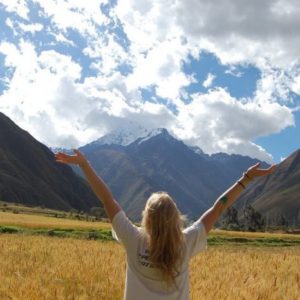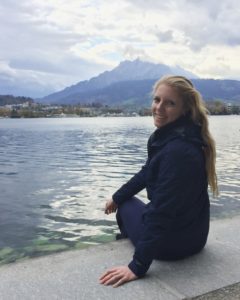The following article was written by Allison Jegla. Allison is an enthusiastic world traveler originally from Portland, Michigan. She attended the University of Pennsylvania and earned a degree in Global Health with a minor in Spanish. Having completed her first few jobs in Health Care advocacy, as of February 2018, she will be living and working remotely with the Remote Year Kanyini cohort. Through her work and travel, Allison is on a quest to learn as many languages as possible, connect with fellow global citizens, and gain an international perspective. She recently shared how learning Spanish changed her educational path and global perspective at the 2017 ACTFL conference.
In his article “Blind Contours of the Classroom: Accepting Uncertainty to Build Student-Teacher Relationships” EF’s George Stewart talks about the experience of having his son as a student. As an educator, George was in a unique position because he had access to both his son’s personal history as well as daily, honest feedback about course content. Without these, the blind contours of a classroom become apparent, as teachers do their best to arrange meaningful material for students without ever knowing if it will click.
The experience of blind contours can be similar for students. Think about the times, as a teacher, you’ve heard the refrain, “yeah, but will we ever use this?”. Students are hit with a veritable flood of information and must organize learning from several subjects to form a coherent mental image. This is especially true for language learning, when vocabulary, conjugations, and speaking rhythm can sometimes feel like disconnected parts of a whole. However, the times when these components sync up to produce language can be among the most victorious moments of a student’s life. There is nothing quite like the feeling of being able to communicate with someone who doesn’t speak your native language.
My own journey from a fledgling Spanish speaker to a language aficionado has run the gamut from frustration to sheer triumph. I grew up in a small Michigan town, where football was king. My classmates and I had known each other since preschool and many of our teachers had also taught our parents. We had only two options for language learning, Spanish and Sign Language. I began taking Spanish classes in high school, largely because it fit more conveniently into my schedule. I could never have imagined the ways in which Spanish would flip my worldview and provoke a lifelong passion for language learning.
 When I first found out about the EF Global Citizen Scholarship, my Peruvian knowledge was limited. I knew that the country was home to Machu Picchu and alpacas– both of which held strong appeal. My dad searched “Peru” on YouTube, deemed it acceptable that I apply for the scholarship, and that was that. As a small-town girl from the Michigan, I had doubts that I would ever be chosen out of thousands of applicants nationwide. When I got the call that I had won, I almost broke my phone speaker with how loudly I screamed.
When I first found out about the EF Global Citizen Scholarship, my Peruvian knowledge was limited. I knew that the country was home to Machu Picchu and alpacas– both of which held strong appeal. My dad searched “Peru” on YouTube, deemed it acceptable that I apply for the scholarship, and that was that. As a small-town girl from the Michigan, I had doubts that I would ever be chosen out of thousands of applicants nationwide. When I got the call that I had won, I almost broke my phone speaker with how loudly I screamed.
From the very beginning, EF elevated the travel process beyond anything I had previously experienced. Through life-changing experiences, my fellow travelers and I were transformed from strangers, to friends, to family.
On tour in Peru I began to feel ill. To be on the safe side, I was taken to the hospital in Cuzco, which presented a unique set of challenges. I had never experienced a language barrier before, but many of the nurses didn’t speak English and my Spanish knowledge peaked around the level of “Hola, como estás?”. Our local guide served as a translator but it was still frustrating that I couldn’t personally communicate with or express my gratitude to the Peruvian nurses.
Because of my experience in the hospital, I returned to the United States with a new energy for both language learning and global health. Fueled by the frustration I had experienced due to the language barrier in Peru, I vowed to become proficient in Spanish so I could help others in the future. I dove deeply into the language through the remainder of my high school career and I even wrote about the growth I experienced in Peru for my admission essay to my dream college.
 The summer after my sophomore year of college, I sought out a job as an au pair in Spain to enhance my language skills. As I explored the streets of Madrid one day, I came across a small shop with vibrantly colored pottery displayed in the windows. Recognizing my status as a foreigner, the elderly storekeeper politely asked “prefiere inglés o español?” For the first time in my life, I chose Spanish without a second thought. What followed was a rich conversation about the pottery’s history, the meaning of each color, and where it was made. Simply by choosing to converse in Spanish my connection to the artwork, and the culture from which it originated, was strengthened. Returning to college, I went on to graduate in 2016 with degrees in Global Health and Spanish.
The summer after my sophomore year of college, I sought out a job as an au pair in Spain to enhance my language skills. As I explored the streets of Madrid one day, I came across a small shop with vibrantly colored pottery displayed in the windows. Recognizing my status as a foreigner, the elderly storekeeper politely asked “prefiere inglés o español?” For the first time in my life, I chose Spanish without a second thought. What followed was a rich conversation about the pottery’s history, the meaning of each color, and where it was made. Simply by choosing to converse in Spanish my connection to the artwork, and the culture from which it originated, was strengthened. Returning to college, I went on to graduate in 2016 with degrees in Global Health and Spanish.
My journey with language learning has truly evolved over the years, and it is certainly not over yet. A few weeks ago, I went to my phone company to switch to an international plan and the clerk asked, “Where will you be traveling?”. I thought for a minute, smiled, and said “everywhere.” On January 28, I am leaving for “everywhere” as part of a program called Remote Year, I will be living and working in twelve countries- across four continents- for one month each. To do this, I am leaving my current position as a healthcare consultant in Washington, DC to be the Vice President of Program Development for an extraordinary college access organization called the Joyce Ivy Foundation. Based in Michigan but with fully remote staff, the mission of Joyce Ivy is to show young Midwestern women that achievement is not limited by geography. Rather, being from the Midwest should be viewed as a source of pride during the college application process and beyond. As someone who initially questioned her place among talented urban peers, I am deeply passionate about inspiring other young women from these areas to push their personal boundaries. As I work to help others discover that the world is full of possibilities, I will be chasing my own dreams through new opportunities as a digital nomad.
When I think back to the wide-eyed Michigander about to embark on a trip to Peru, I can’t help but think that she would be stunned by how vibrant life has become because of travel and language. Many of my strongest friendships have started or been enhanced on the road, train tracks, or in the air. Travel has expanded my perspective and showed me that I love living in large urban areas, including Philadelphia, Washington, D.C., and New York City. Travel has made me fully understand and appreciate the value of those sprawling cornfields and close personal connections in Michigan. Because I have traveled, I am prouder than ever of who I am and where I come from.
Language, more than any other course of study, equips us with a toolkit to connect with other people. As it has done for me, language education empowers students to engage with their communities, opens doors to new professional and personal opportunities, and can fan the flames for a lifelong love of learning. The power to ignite that spark starts in your classrooms. Thank you for the work that you do each and every day to inspire the next generation of global citizens.
Learn more about the EF Global Citizen Scholarship or explore our Language Immersion Tours!
Related articles
